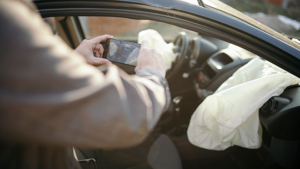
If you are able, take photos to document circumstances of the accident.
Your first instinct after a car accident may be to call for help. Do you have a plan for what comes next? Being proactive in your response can help keep you, your passengers and your property safe while simplifying the process of filing an insurance claim.
Ensure safety
- Consider moving your vehicle onto the shoulder or side of roadway to prevent further damage.
- Stand a safe distance away from traffic and if vehicles are severely damaged, maintain a distance to avoid unsafe conditions such as car fires or explosions.
- Activate your hazard lights and place safety flares or signs promptly to alert other drivers.
- Contact the police or confirm they have been notified if you are unable to place the call yourself.
- For injuries, contact medical assistance and await their arrival. Do not administer first aid unless qualified to do so.
Keep your composure
- Remain calm. Keep a clear mind and focus on your safety and gathering relevant information. If you are driving a company-owned vehicle, follow your company’s reporting procedures as soon as possible.
- Be courteous but refrain from accepting responsibility or apologizing for anything. It is best to speak only to a police officer when making statements regarding the accident.
- Don’t argue. Situations can escalate quickly. It is best to review circumstances surrounding the accident with a police officer present.
Gather information
- If possible, collect contact information of the responding officer. Make note of their name, department, badge number and the incident report number.
- When appropriate, request contact information from other involved insured drivers including name, phone number and vehicle license plate number. If a company vehicle is involved, record the employer’s name.
- Provide only the necessary contact information to others involved in the accident; first and last name, phone number and insurance carrier should suffice. Scammers sometimes use an auto accident as a way to collect personal information for identity theft.
- Collect any passenger or witness information and request that they remain at the site of the accident until police arrive. Passengers and witnesses can often recount important details or circumstances that may assist in the report.
Note surrounding circumstances
- Take in your surroundings and make notes for your own future reference. If possible, take a few photos to support your observations. Keep a copy of our brochure in your glovebox (PDF 416k) to help you record details after an accident.
- Note contributing factors such as inclement weather, hazardous road conditions, visual obstructions or faulty traffic indicators.
- Make note of any observed injuries for individuals involved in the accident and describe additional collateral damage to vehicles or property.
It is most helpful to record details sooner rather than later. Gathering detailed information following your accident can help potential investigative needs and provide a clear and concise description for your agent.
This loss control information is advisory only. The author assumes no responsibility for management or control of loss control activities. Not all exposures are identified in this article. Contact your local, independent agent for insurance coverage advice and loss control information. Neither The Cincinnati Insurance Company nor its affiliates or representatives offer legal advice. Consult with your attorney about your specific situation.

